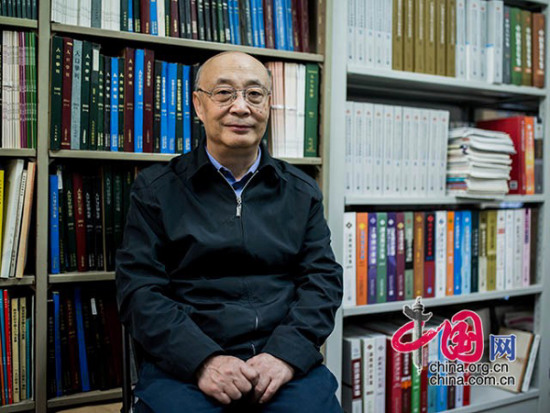
Zhai Zhenwu, vice chairman of China Population Association and professor of sociology and population studies at Renmin University of China. (Photo: China.org.cn/Zheng Ling)
The third reason is an overall decline in the country's birth rate. This is related to the state family planning policy implemented for nearly four decades known as the "one-child policy."
A relatively weak social security system in rural areas
Prof. Zhai argued that the social security system in rural areas is still weaker compared with that in urban areas. "That's why the old saying of 'bringing up sons to provide against old age' still prevails in rural areas," he said.
The law provides that both men and women have the obligation to support the elderly; however, in reality, rural men, especially, still bear the largest obligation to support older generations. Another old Chinese saying says that, "a married daughter is like spilt water," meaning she is no longer a member of the family but has obligations, instead, to her parents-in-law.
The professor said people in rural areas are still engaged in heavy manual and physical labor and that boys can make a greater contribution to the family than girls in terms of agricultural production.
In some remote rural areas, men even still have the obligation of "having a son to carry on the family name," as the names of female family members often cannot be placed in ancestral halls.
Gender discrimination in job market
"We need to do a lot of work in abolishing gender discrimination in employment and to pursue equality between men and women, which is a permanent solution to the issue," he said.
Gender discrimination still exists in employment in China where it is more difficult for a female university graduate to find a job than a male counterpart. "I think abolishing gender discrimination in employment to pursue gender equality is the most fundamental measure to narrow the gap in the gender ratio.
"We must aim for permanent control of the problem of imbalanced gender ratios at birth and recognize that we cannot solve the problem by taking only stopgap measures."
Speaking of the current implementation of a two-child policy, Prof. Zhai said it will surely promote healthy population development and result in an overall sex ratio difference at birth declining.
With the modernization and development of urbanization and the improvement of education standards, people's preference for boys at birth will get weaker and weaker, he stressed.


















































